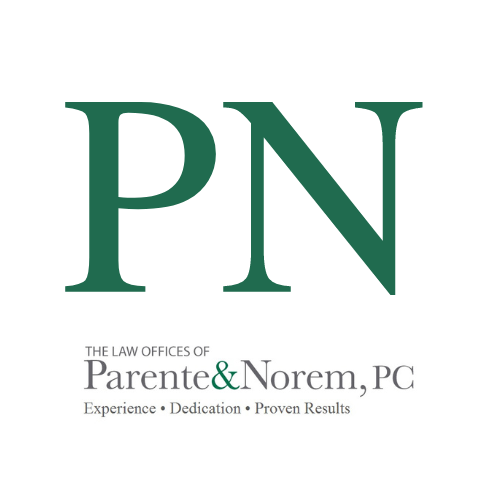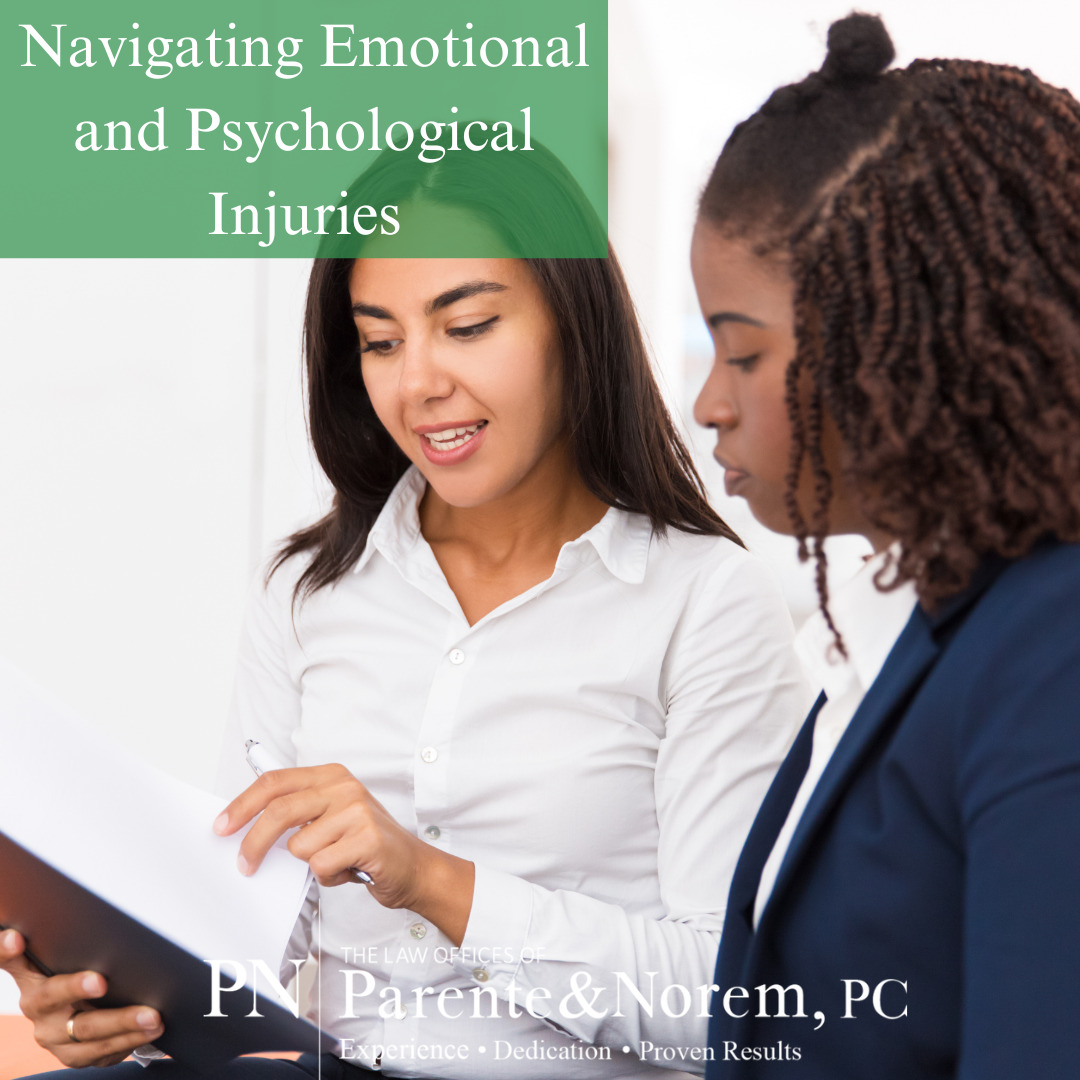
P&N BLOG | Navigating Emotional and Psychological Injuries
When people think of personal injury, physical damage often comes to mind—broken bones, bruises, or surgeries. However, what many don’t realize is that injuries can cut deeper than the physical. Emotional and psychological trauma are often silent but just as impactful. As a personal injury firm, we’re committed to helping our clients recover from all aspects of an injury, not just the visible ones.
Understanding Emotional and Psychological Trauma in Personal Injury Cases
Emotional and psychological injuries refer to the mental and emotional suffering that may follow a traumatic incident. These injuries can stem from any event that disrupts a person’s life, such as a car accident, workplace injury, medical malpractice, or other traumatic situations.
These hidden injuries can manifest in various ways, including:
Anxiety or panic attacks – A once-simple drive to work may now trigger overwhelming fear.
Depression – Feelings of hopelessness and sadness can take over, especially when facing the uncertainty of recovery or the loss of a loved one due to negligence.
Post-Traumatic Stress Disorder (PTSD) – A person may experience flashbacks, nightmares, or heightened anxiety following a traumatic event.
Sleep disturbances – Insomnia or disrupted sleep patterns are common after a traumatic incident.
Emotional instability – Anger, irritability, or emotional outbursts may occur more frequently.
It’s important to note that while a lot of feelings can emerge when you’ve been injured by another’s negligence, hurt feelings or ‘feeling disrespected’ do not qualify as emotional or psychological trauma.
Why Emotional and Psychological Injuries Matter
These hidden injuries can be just as debilitating as physical ones. Imagine trying to heal a broken leg while simultaneously dealing with crippling anxiety about driving or chronic depression. Emotional and psychological trauma can delay or complicate physical recovery, impact relationships, and even make it difficult for a person to return to work.
Ignoring these injuries can leave long-term scars. That’s why it’s essential to address them early and comprehensively. When left untreated, emotional trauma can evolve into chronic conditions that require long-term therapy or medication.
Recognizing Signs of Emotional and Psychological Trauma
As a personal injury client, it’s crucial to recognize the signs of emotional and psychological distress so you can seek the right kind of help. Here are some signs to watch for:
Changes in mood – Persistent feelings of sadness, irritability, or anger that don’t seem to pass.
Withdrawal – A desire to isolate from friends, family, or activities you once enjoyed.
Trouble focusing – Difficulty concentrating on tasks, work, or even conversations.
Hypervigilance – Constantly feeling on edge or overly aware of potential threats.
Physical symptoms – Headaches, stomach issues, and fatigue can often be related to emotional stress.
If you or someone you know is experiencing any of these symptoms following an injury, it’s important to seek help.
Injury recovery is about more than just mending broken bones or healing cuts—it’s about piecing back together your life and sense of well-being. Emotional and psychological injuries can be hidden and hard to talk about, but they are an essential part of your healing process. At The Law Offices of Parente & Norem, P.C., we’re committed to supporting you through the entirety of your recovery, ensuring that all aspects of your injury—physical, emotional, and psychological—are addressed.
If you or someone you love has been injured due to another’s negligence, call/text The Law Offices of Parente & Norem, P.C. at 312.641.5926 today for a free case evaluation.
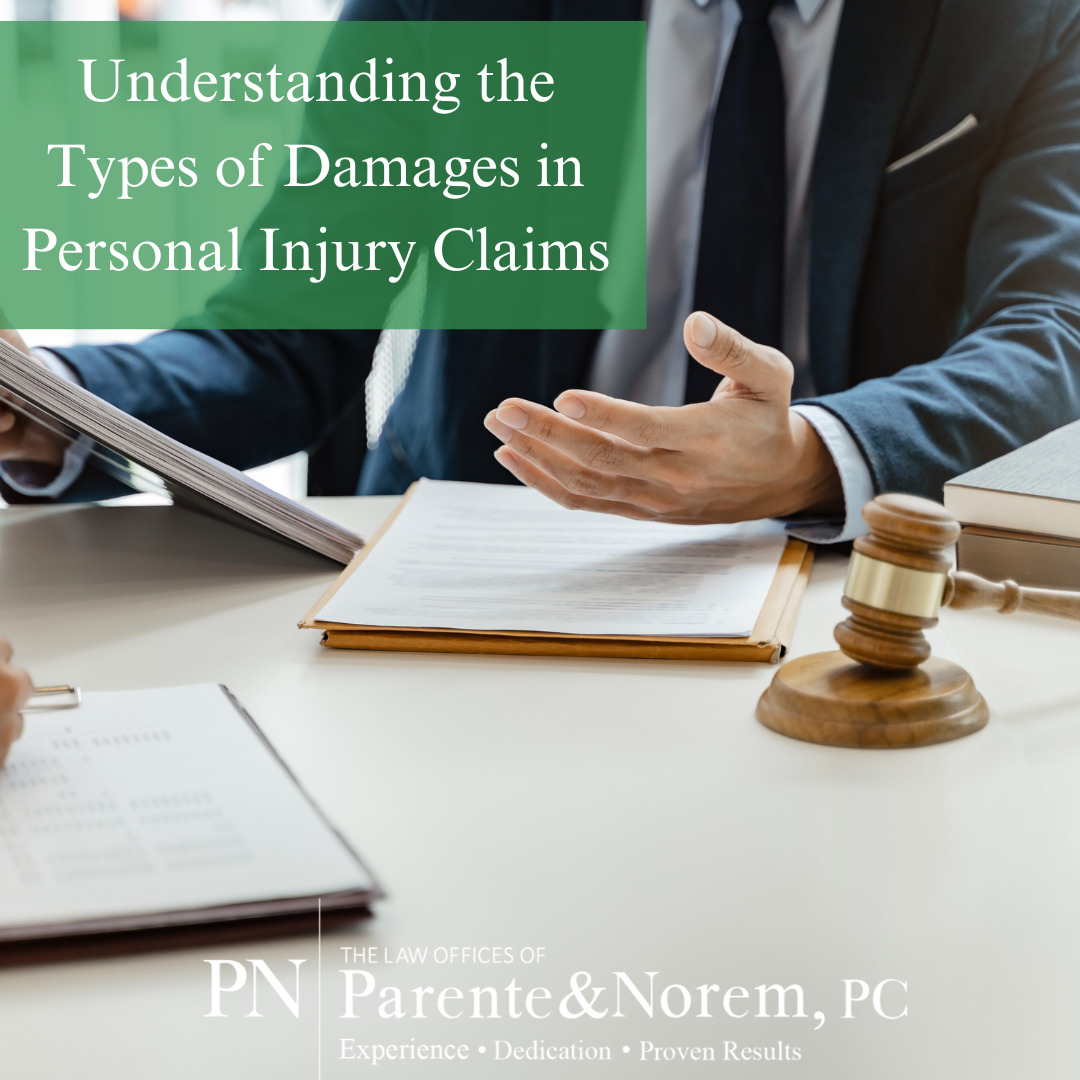
P&N BLOG | Understanding the Types of Damages in Personal Injury Claims
When individuals suffer harm due to accidents or negligence, they may be entitled to compensation through personal injury claims. These claims serve to restore the injured party, as much as possible, to their pre-accident condition by covering financial losses, emotional harm, and other negative impacts caused by the injury. If you’re pursuing a personal injury claim, it’s essential to understand the types of damages you may be entitled to. Below, we’ll explore the three main categories of damages; economic, non-economic, and punitive damages, and what each entails.
Economic Damages
Economic damages are tangible financial losses that result directly from the injury. They are intended to reimburse you for actual expenses and losses you’ve incurred or will incur in the future due to the accident. These damages are usually straightforward to calculate because they are based on documented costs such as bills, invoices, and pay stubs.
Examples of economic damages include:
Medical Expenses – This includes the cost of doctor visits, hospital stays, surgeries, rehabilitation, medications, and ongoing treatment needs. Future medical expenses can also be claimed if your recovery will require long-term care.
Lost Wages – If your injury prevents you from working, either temporarily or permanently, you can recover the income you’ve lost. This also includes future lost earning potential if you are unable to return to your previous occupation or work capacity.
Property Damage – In cases like car accidents, property damage covers the repair or replacement of your vehicle or other personal property involved in the incident.
Other Out-of-Pocket Costs – Expenses like transportation to medical appointments, assistive devices (such as wheelchairs), or home modifications for disability may also be covered.
Non-Economic Damages
While economic damages compensate for tangible losses, non-economic damages address the intangible impacts of an injury. These damages can be harder to quantify since they deal with emotional, psychological, and physical suffering caused by the incident.
Examples of non-economic damages include:
Pain and Suffering – This refers to the physical pain and discomfort endured as a result of the injury.
Emotional Distress – Accidents can leave victims dealing with anxiety, depression, or post-traumatic stress disorder (PTSD). Compensation for emotional distress accounts for these mental health impacts.
Loss of Enjoyment of Life – If the injury prevents you from participating in activities or hobbies you once enjoyed, you may be entitled to compensation for this diminished quality of life.
Loss of Consortium – In some cases, an injury can negatively impact the relationship between spouses or family members. Loss of consortium claims address the loss of companionship, affection, and support within these relationships.
Because non-economic damages are subjective, they often require the involvement of expert witnesses or testimony from therapists, family members, and the injured party to determine an appropriate value.
Punitive Damages
Punitive damages are awarded in cases where the defendant’s actions were particularly reckless, malicious, or intentional. Unlike economic and non-economic damages, punitive damages are not meant to compensate the victim but to punish the wrongdoer and deter similar conduct in the future. These damages are less common and typically only awarded in extreme cases, such as drunk driving accidents or instances of gross negligence.
Punitive damages vary significantly by jurisdiction, and some states place limits or caps on the amount that can be awarded. A skilled personal injury attorney can advise whether your case qualifies for punitive damages based on the specific circumstances.
Why It’s Important to Work with a Personal Injury Attorney
Understanding the types of damages you may be entitled to is critical for maximizing your personal injury claim. Calculating these damages; especially non-economic and punitive damages, can be complex and often requires experienced legal guidance. A personal injury attorney will not only ensure that all applicable damages are identified but also gather the necessary evidence to support your claim, including medical records, expert testimony, and financial documentation.
Additionally, insurance companies often try to settle claims for less than they are worth, particularly when non-economic damages are involved. Having a lawyer by your side helps level the playing field, ensuring you receive fair compensation for your injuries and losses.
If you or a loved one has been injured due to someone else’s negligence, understanding the different types of damages available is crucial for recovering the compensation you deserve. Economic damages cover your out-of-pocket losses, non-economic damages address your emotional and psychological suffering, and punitive damages may apply in extreme cases. An experienced personal injury attorney can evaluate your case, identify all applicable damages, and advocate for your best interests to achieve a fair settlement or court award.
At The Law Offices of Parente & Norem, P.C., we specialize in personal injury cases and are dedicated to helping our clients rebuild their lives after an accident. Contact us today at 312.641.5926 for a free consultation and learn how we can assist you in your pursuit of justice and compensation.

Christopher M. Norem Honored with Fellowship in the International Society of Barristers
The Law Offices of Parente & Norem, P.C. would like to congratulate Christopher M. Norem on his acceptance of Fellowship into the International Society of Barristers.
The International Society of Barristers (ISOB) has a membership of less than 750 lawyers adjudged by their peers and judges to be “outstanding in the field of advocacy,” the Society seeks to honor the role of trial lawyer in our system of justice. One of its principal goals is the preservation of the adversary system and jury trial.
The ISOB was founded in 1965. Its founders conceived the organization to bring together the best of the trial bar in a setting devoid of partisan interests. The Society’s membership consists of Fellows of the Society. As individuals, the Fellows of the Society are committed to the highest of ethical standards and to civility in all their personal and professional relationships. One of the hallmarks of the organization is the inclusion of members’ spouses or significant others as full participants in the activities of the Society.
With a limited membership, the Society has Fellows from every state, the District of Columbia, Puerto Rico, and the Virgin Islands, and from Australia, Canada, England, Scotland, and Ireland, with the great majority from the United States.
No lawyer may apply for membership in the Society. New Fellows are elected by the Society’s Board of Governors on nomination by an existing Fellow and after inquiry as to the nominee’s skill as a trial lawyer and personal and professional integrity directed to other Barristers in the nominee’s region and to judges before whom the nominee has tried cases.
Mr. Norem’s acceptance into the ISOB is a testament to his outstanding advocacy, professionalism, and commitment to justice. It also reflects the high regard in which he is held by his peers and the judiciary. This achievement not only honors Mr. Norem personally but also underscores the caliber of legal representation offered by the Law Offices of Parente & Norem, P.C.

Christopher M. Norem Awarded JVR Plaintiff Attorney Achievement Award
The Law Offices of Parente & Norem, P.C. would like to congratulate Christopher M. Norem on being awarded the JVR Plaintiff Attorney Achievement Award at the JVR Awards on October 16, 2024.
Only a select few lawyers meet the criteria for the prestigious Plaintiff Attorney Achievement Award, making this a true testament to Mr. Norem’s exceptional advocacy, professionalism, and dedication to justice. It also highlights the esteem he holds among his peers. This honor not only celebrates Mr. Norem’s personal accomplishments but also emphasizes the high-quality legal representation provided by The Law Offices of Parente & Norem, P.C.
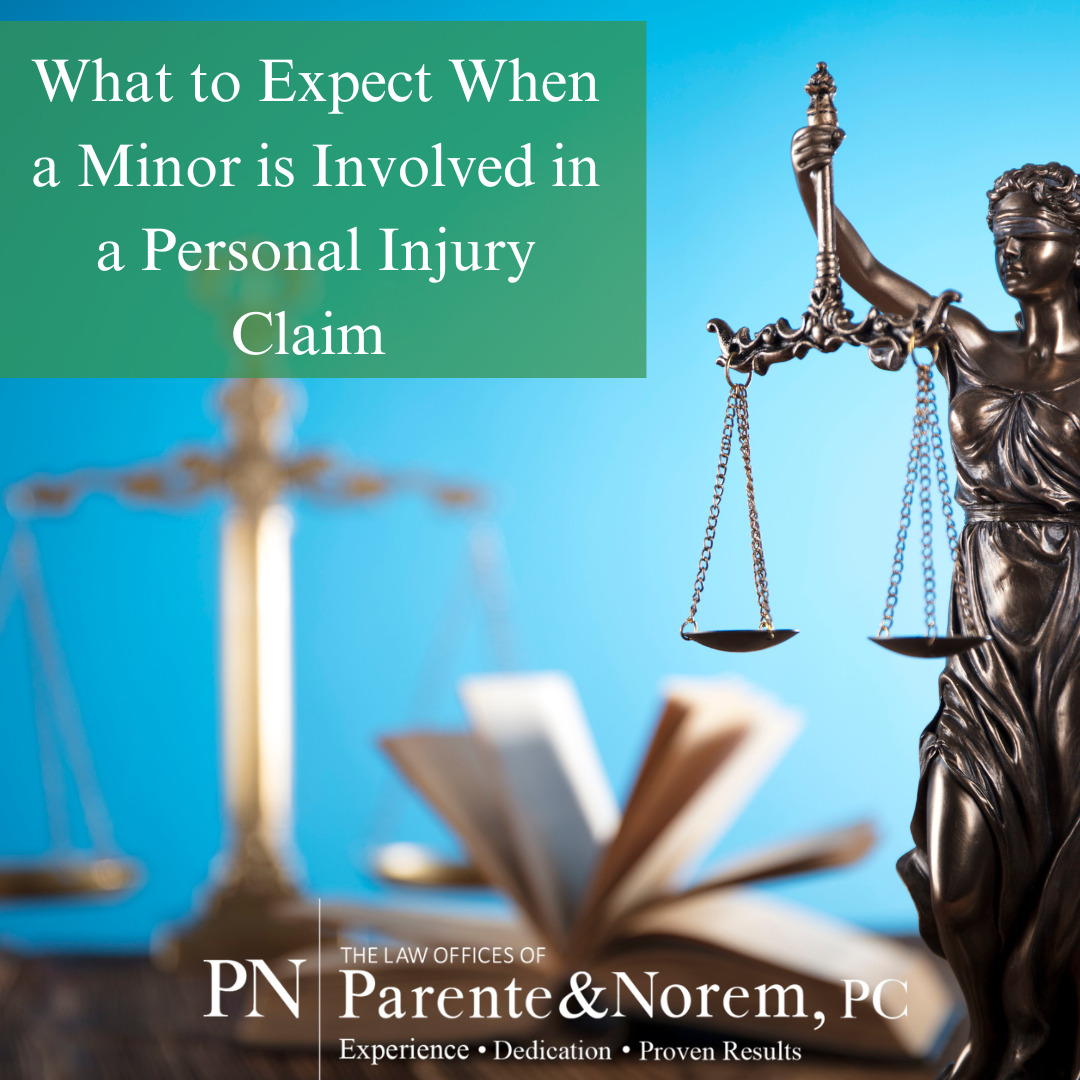
P&N BLOG | What to Expect When a Minor is Involved in a Personal Injury Claim
When a child is injured due to someone else’s negligence, the legal process becomes more complex than a typical personal injury claim. Special rules and protections are in place to ensure that the child’s best interests are considered. Whether the injury involves a car accident, premises liability, or medical malpractice, understanding the legal steps can help families navigate the process with greater confidence. On today’s blog, let’s outline what parents and guardians need to know when filing a personal injury claim involving a minor.
Who Can File the Claim?
Since minors (children under 18) are legally unable to represent themselves in court, a parent or legal guardian must file the personal injury claim on their behalf. In some cases, a guardian ad litem may be appointed to represent the child’s best interests, especially if there is a conflict of interest with the parents, such as a case where a parent may also be liable.
Parents and guardians act as the child’s advocate throughout the legal process. However, any compensation awarded in the case belongs to the child and is intended to cover the costs of the injury, such as medical bills, pain and suffering, and future losses.
Statute of Limitations
The statute of limitations—the time period after the accident when a claim must be filed—often works differently for minors. In many states, the clock does not start until the child turns 18. However, this rule varies depending on the nature of the injury, the type of defendant involved, and the laws of your state. Consulting a personal injury attorney early in the process ensures that important deadlines aren’t missed.
How Compensation is Handled
Any settlement or compensation awarded in a personal injury claim for a minor is carefully monitored by the court to protect the child’s financial interests. In many cases, the court will require the funds to be placed in a trust, structured settlement, or blocked bank account until the child turns 18.
This process ensures that the money is used as intended—to support the child’s needs, such as medical care or education—and is not mismanaged by the parents or others.
What to Expect from Court Involvement
When a minor is involved in a personal injury claim, courts often play a more active role. For settlements, a judge may need to approve the agreement to confirm that it is fair and in the child’s best interest. This step is known as a minor settlement hearing. At this hearing, the judge will review the terms of the settlement, the nature of the injury, and any future care the child may need before giving approval.
Types of Damages Available
In personal injury cases involving minors, damages may include:
Medical Expenses: Current and future medical costs related to the injury.
Pain and Suffering: Compensation for the physical pain and emotional distress the child has endured.
Loss of Future Earnings: If the injury affects the child’s ability to earn a living in the future.
Parental Loss of Income: Some claims may include compensation for a parent’s lost wages if they had to miss work to care for the injured child.
Settling vs. Going to Trial
In most personal injury claims involving minors, settlements are preferred. A settlement provides certainty and avoids the risks and emotional toll of a trial. However, the decision to settle or proceed to trial depends on several factors, including the strength of the case, the amount offered, and whether future needs are adequately covered by the settlement amount.
If a settlement is reached, the court’s approval ensures that the agreement is fair to the child. A personal injury attorney will negotiate on behalf of the family, working to secure the best possible outcome for the child’s present and future needs.
Working with a Personal Injury Attorney
Given the complexities of cases involving minors, working with an experienced personal injury attorney is essential. An attorney can guide parents through the legal process, ensuring the child’s rights are protected, and negotiate with insurance companies to secure fair compensation. Attorneys are also familiar with local rules regarding minor settlements and can streamline court procedures.
When a minor is involved in a personal injury claim, the legal process requires additional care to ensure that the child’s long-term well-being is protected. From filing the claim to handling compensation and navigating court involvement, every step must be carefully managed. Consulting a knowledgeable personal injury attorney early on will help families avoid pitfalls and secure the best outcome for the child’s future.
If your child has been injured due to someone else’s negligence, call/text The Law Offices of Parente & Norem, P.C. at 312.641.5926 for a free consultation with one of our experienced personal injury attorneys. We are here to help you every step of the way and ensure that your child receives the care and compensation they deserve.
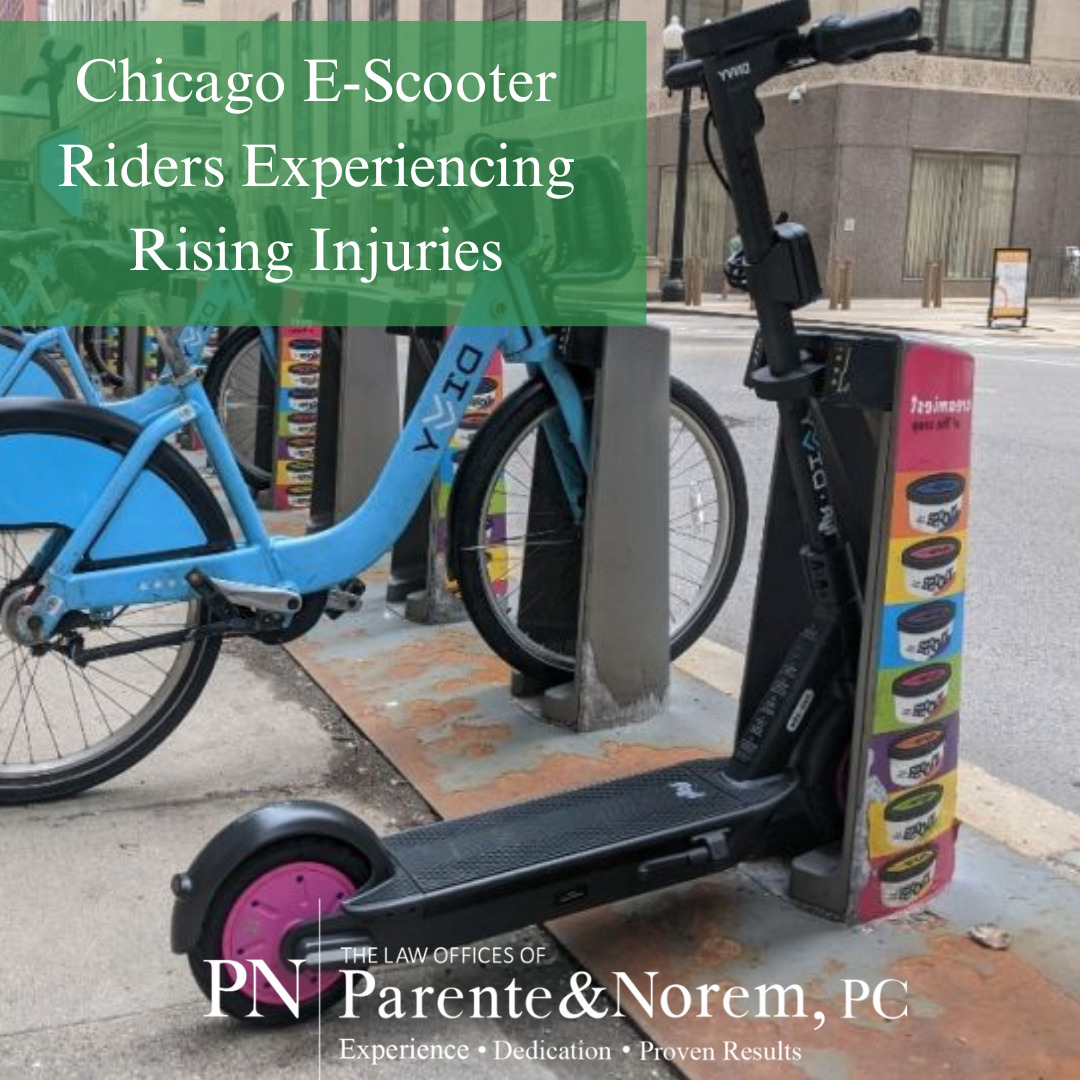
P&N BLOG | Chicago E-Scooter Riders Experiencing Rising Injuries
In recent years, the streets of Chicago have seen a dramatic rise in e-scooter use. However, with the growing popularity of these micromobility devices comes an increase in serious injuries, with no comprehensive system in place to track how often riders are getting hurt.
Consider the case of Marie-Claire Ching, a 20-year-old Chicago resident who experienced two e-scooter accidents within weeks of each other. While riding her Segway scooter in the city, Ching was first struck by a car turning in front of her on Halsted Street. Less than two weeks later, she was hit again, this time by a BMW that ran a red light. Both incidents left her shaken and injured, underscoring the hazards that e-scooter riders face on Chicago’s busy streets.
Ching’s experiences are not isolated. Since e-scooters were introduced to the city in 2019, their use has skyrocketed. Between mid-2022 and late 2023, more than 3.7 million e-scooter trips were recorded, a significant increase from previous years. However, despite this surge in ridership, data on scooter-related injuries is noticeably absent. According to the Chicago Department of Transportation (CDOT), the city does not actively track these incidents, and e-scooter companies like Lime and Lyft’s Divvy have not shared local crash data.
The lack of transparency around e-scooter accidents is alarming, especially as healthcare providers report a rise in injuries. Dr. David Trotter, chair of emergency medicine at Advocate Illinois Masonic Medical Center, notes a steady uptick in e-scooter-related traumas. His hospital, which handles Level 1 trauma cases, has seen injuries ranging from minor cuts to traumatic brain injuries, particularly in riders who fail to wear helmets.
E-scooter injuries aren’t limited to scrapes and bruises. Fatal accidents are also possible. In 2022, Rayshawn D. Thomas was tragically killed when a truck struck him while riding his scooter in the Austin neighborhood. Unfortunately, incidents like these are becoming more frequent, with a 2023 Consumer Product Safety Commission report showing a 21% increase in micromobility device injuries nationwide compared to the previous year.
The city’s efforts to improve rider safety have been incremental. CDOT has worked with rental companies to introduce in-app safety quizzes and continues to expand bike lanes, which e-scooter riders can use. However, these measures alone are not enough to prevent accidents. Safety advocates like Christina Whitehouse of Bike Lane Uprising argue that more must be done to protect riders and other vulnerable road users.
For riders like Ching and others who have sought legal counsel after their crashes, the road to recovery is not only physical but financial. High medical bills, lost wages, and ongoing health issues are common struggles. As the popularity of e-scooters continues to grow, it’s clear that Chicago needs a better system to protect riders and hold negligent parties accountable. Without proper data and enforcement, the risks for e-scooter users will remain dangerously high.
—
If you or a loved one has been injured in an e-scooter accident, The Law Offices of Parente & Norem, P.C. is here to help. Contact us at 312.641.5926 for a free consultation.
Source – Chicago Sun-Times

P&N BLOG | How Social Media Can Affect Your Personal Injury Case
Social media has become an integral part of daily life. Platforms like Facebook, Instagram, Twitter, and TikTok allow us to stay connected, share personal experiences, and engage with others. But while sharing updates and staying active online can be fun, it’s essential to understand that your social media activity can have serious consequences—especially if you’re involved in a personal injury case.
In fact, social media can be a double-edged sword in personal injury claims, with posts, photos, and even comments used by insurance companies or opposing counsel to undermine your case. Below, we’ll explore how social media can impact your personal injury claim and offer practical tips for managing your online presence to avoid common pitfalls.
How Social Media Can Be Used Against You
When you file a personal injury claim, the goal is to seek compensation for the physical, emotional, and financial harm you’ve suffered. However, the other side—whether it’s an insurance company or the defendant’s legal team—will often look for ways to minimize or discredit your injuries. One way they do this is by scrutinizing your social media activity. Here’s how it can happen:
Contradictory Posts
Suppose you claim that your injury has severely impacted your ability to perform daily tasks, but then you post a picture of yourself hiking, at the gym, or engaging in other physical activities. Even if that picture represents a rare good day or a carefully managed moment, it can be used to argue that your injuries are not as severe as you’ve claimed.
Comments Can Be Misinterpreted
Comments and responses to your posts, even ones made in jest, can be taken out of context. A seemingly harmless comment like “I’m feeling great today!” could be used to suggest that your injuries are not as debilitating as you claim.
Location Check-ins and Tags
Checking into a restaurant, concert, or vacation destination may be seen as evidence that you are not as injured as you have portrayed. Even being tagged in someone else’s post at an event could raise suspicion.
Emotional Well-being
Personal injury claims often include damages for emotional distress, yet social media posts showing you smiling, laughing, or enjoying time with friends could be presented as proof that you are not experiencing significant emotional suffering.
Online Interactions
Engaging with others online, such as discussing your case or venting frustrations, can also backfire. Opposing parties can use those interactions to argue that you’ve been inconsistent or exaggerating your claims.
How Courts and Insurance Companies Use Social Media
Social media evidence is increasingly being accepted in courtrooms, and it’s not just public posts that can be used against you. Even if your account is private, courts can subpoena social media records or request access to specific posts. Insurance companies may also monitor your online activity, looking for any information that could help them lower your settlement offer.
Additionally, any inconsistencies between your social media presence and the statements you make in court or to your attorney can be used to challenge your credibility, potentially harming your case.
Practical Advice for Managing Your Social Media Presence
Now that we’ve discussed how social media can impact your personal injury case, here are some practical tips to help you protect your claim:
Limit Your Social Media Activity
The safest course of action is to avoid posting on social media altogether while your case is ongoing. If that’s not possible, significantly reduce your activity and be mindful of everything you post.
Adjust Your Privacy Settings
Make sure your social media accounts are set to private. While this doesn’t guarantee complete protection—since posts can still be subpoenaed—it adds an extra layer of defense against casual snooping by insurance companies or opposing counsel.
Avoid Posting About Your Case
Never discuss the details of your case, your injury, or any aspect of your legal proceedings on social media. Even vague statements can be twisted and used against you.
Ask Friends and Family to Be Cautious
If friends or family tag you in posts or photos, ask them to refrain from doing so until your case is resolved. Even well-meaning posts can inadvertently harm your claim.
Be Mindful of All Content
Remember that images, videos, and even comments can be used as evidence. Avoid posting anything that could be interpreted as contradictory to your injury claims, no matter how innocent it seems at the time.
Think Before You Post
Before posting anything, ask yourself, “Could this be used against me?” If there’s even the slightest doubt, it’s better to hold off until your case is settled.
Social media is a powerful tool, but when you’re involved in a personal injury case, it’s crucial to understand how your online activity can affect the outcome. Insurance companies and defense attorneys are always looking for ways to reduce their liability, and your social media posts might provide them with the evidence they need.
By taking a proactive approach—limiting your posts, adjusting your privacy settings, and staying mindful of your interactions—you can protect yourself and your personal injury claim. When in doubt, always consult your attorney for guidance on how to manage your online presence throughout your case. If you have been injured, and would like to speak with one of our experienced personal injury attorneys, call/text The Law Offices of Parente & Norem, P.C. today at 312.641.5926 or fill out a contact form here on our website.

P&N BLOG | Panera Bread Reaches First Settlement in Wrongful Death Lawsuits Over Charged Lemonade
Panera Bread has reached its first settlement related to the wrongful death lawsuits stemming from its controversial Charged Lemonade. This marks the first resolution in a series of legal actions filed against the company after the death of Sarah Katz, a 21-year-old University of Pennsylvania student who suffered cardiac arrest in 2023 after consuming the high-caffeine drink.
Katz, who had a pre-existing heart condition, died just hours after drinking one of Panera’s Charged Lemonades. The lawsuit filed by her family was the first in a wave of litigation following the incident, which has raised concerns about the safety and transparency of the drink’s contents.
The family’s legal representation, Elizabeth Crawford, a partner at Kline & Specter, PC, confirmed the settlement in a statement shared with USA TODAY. However, she did not disclose specific details regarding the terms of the agreement. According to Crawford, additional lawsuits related to the Charged Lemonade remain unresolved and are still being pursued.
This settlement, first reported by NBC News, is just one of several lawsuits Panera faces over the now-discontinued drink. Other cases include the death of 46-year-old Dennis Brown from Fleming Island, Florida, and a claim of permanent injury by 28-year-old Lauren Skerritt of Rhode Island.
At the center of the controversy is the Charged Lemonade’s high caffeine content, with a large serving containing 390 milligrams of caffeine—equivalent to the amount found in multiple cans of energy drinks. Initially, Panera added warning labels to the beverages in response to the lawsuits, but the company has since removed the product from its stores nationwide as part of a broader “menu transformation.”
Panera Bread has not yet issued an official statement regarding the settlement or the pending lawsuits.
As the legal proceedings continue, the case highlights growing concerns about the transparency of ingredients in popular beverages, particularly for consumers with underlying health conditions. For now, Panera’s move to settle the Katz family’s lawsuit is a critical step in addressing the fallout from this tragic incident.
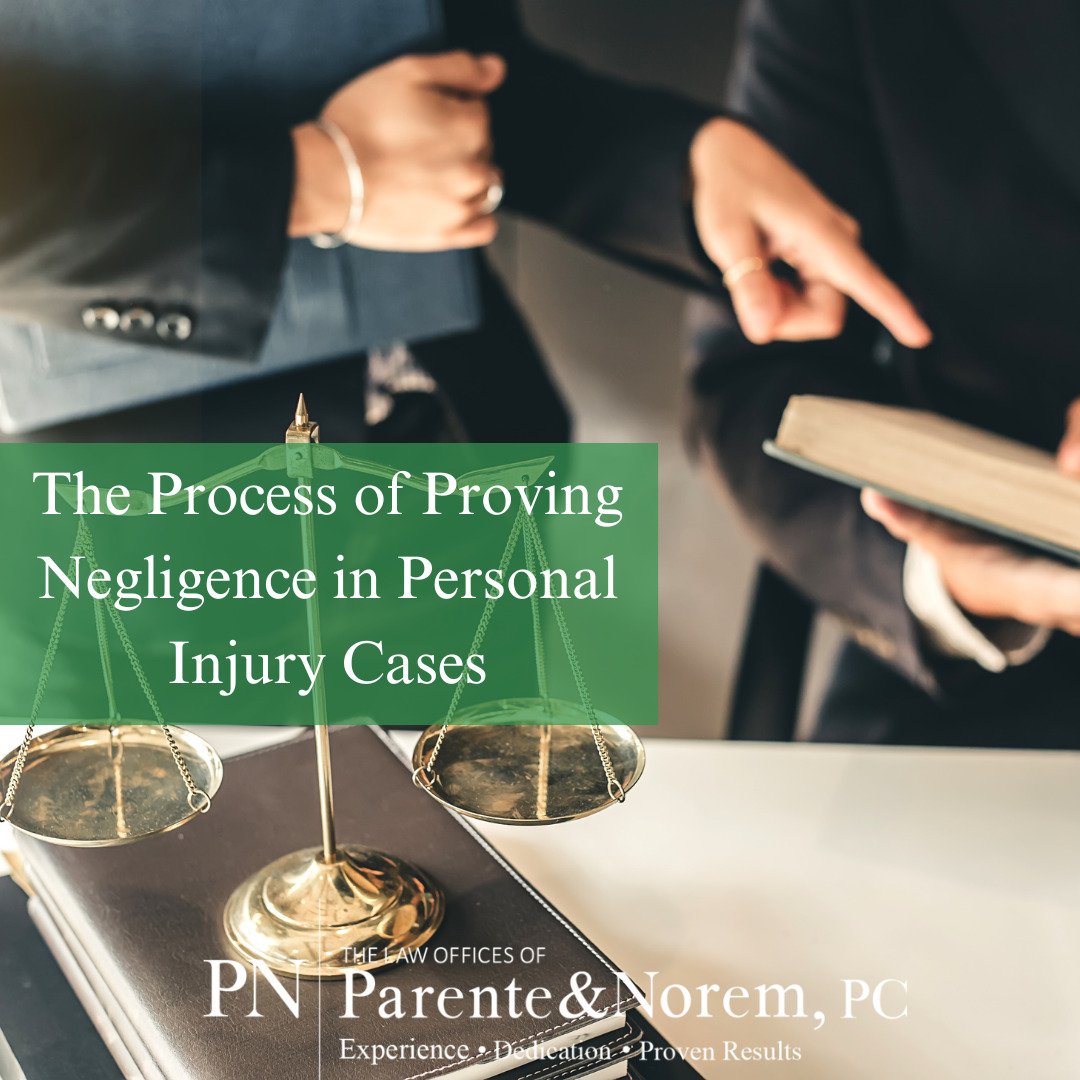
P&N BLOG | The Process of Proving Negligence in Personal Injury Cases
Negligence is at the heart of most personal injury cases. Whether it’s a car accident, a slip and fall, or a medical malpractice claim, proving that another party’s carelessness caused your injury is essential to securing compensation. But for most people, understanding how to prove negligence in court can seem complicated and overwhelming. In this blog post, let’s break down the process into clear, manageable steps, so you know what to expect and how to strengthen your case.
What Is Negligence?
In personal injury law, negligence occurs when someone fails to take reasonable care to avoid causing harm to others. For example, a driver speeding through a red light is acting negligently because they are ignoring basic traffic laws designed to keep others safe.
To win a personal injury lawsuit, you must prove that the other party was negligent and that their negligence directly caused your injuries. This requires gathering evidence and presenting a persuasive case to show that they failed to act responsibly.
The Four Elements of Negligence
To prove negligence, you and your attorney will need to establish four key elements in court:
Duty of Care: You must demonstrate that the defendant (the person or entity you are suing) had a legal duty to act in a way that would prevent harm. For example, all drivers have a duty to follow traffic laws and drive safely.
Breach of Duty: You need to show that the defendant failed to uphold their duty of care. In the case of a car accident, for example, this could involve proving that the driver was speeding, texting while driving, or otherwise violating traffic laws.
Causation: It’s not enough to prove that the defendant was negligent; you also need to prove that their actions directly caused your injury. For instance, you need to show that you wouldn’t have been hurt if the other driver hadn’t run a red light.
Damages: Finally, you must demonstrate that you suffered actual harm as a result of the negligence. This could include medical bills, lost wages, pain and suffering, or other consequences of the injury.
Each of these elements must be proven for a negligence claim to succeed. Failing to establish even one can lead to a dismissal of the case, so understanding how to gather and present evidence is critical.
Gathering Evidence to Prove Negligence
Building a strong personal injury case hinges on the quality of the evidence you present. Here are some of the most common types of evidence used to prove negligence:
Police Reports: After an accident, police often file a report that includes details about the scene, witness statements, and the officer’s own observations. These reports can be powerful evidence in court.
Medical Records: Medical documentation serves as proof of your injuries. These records will help establish the extent of your injury, how it was treated, and how it affects your day-to-day life.
Photographs and Videos: Visual evidence is often more compelling than words alone. Pictures or video footage from the accident scene, security cameras, or even cell phones can provide strong proof of negligence.
Witness Statements: Eyewitnesses who saw the accident can provide valuable testimony about what happened. Their accounts can corroborate your version of events and strengthen your claim.
Expert Testimony: In complex cases, such as medical malpractice or defective products, expert witnesses can explain how the defendant’s actions fell below the accepted standard of care in their industry.
Establishing Liability
Once you have gathered evidence, the next step is to establish liability by connecting the defendant’s breach of duty to your injury. This involves demonstrating that, “but for” the defendant’s actions, you wouldn’t have been injured.
In many cases, proving causation can be difficult, especially when the defendant tries to shift blame. For example, in a slip-and-fall case, the defendant might argue that you were not paying attention or that the hazard was clearly marked. Having strong evidence that proves the defendant’s negligence caused your injury will make it harder for them to argue against liability.
Presenting a Persuasive Case in Court
Finally, once the evidence is gathered and liability is established, the case must be presented in court. This is where having a skilled personal injury attorney becomes crucial. Your lawyer will know how to build a persuasive narrative, present evidence clearly, and cross-examine witnesses to discredit the defendant’s claims.
A well-argued case backed by solid evidence can make the difference between a favorable settlement and a dismissed case. But if you’re struggling with the complexities of proving negligence, don’t hesitate to reach out for legal assistance.
When to Seek Legal Help
Proving negligence is not always straightforward. There are legal procedures to follow, and the defendant may attempt to deny liability or offer a lowball settlement. If you’re facing challenges in your personal injury case, contact a personal injury lawyer as soon as possible.
Our experienced attorneys at The Law Offices of Parente & Norem, P.C. can help you navigate the legal system, gather the evidence you need, and advocate on your behalf. Don’t leave your future to chance—call/text Parente & Norem at 312.641.5926 to help to protect your rights and maximize your compensation.
By understanding the process of proving negligence and working closely with a skilled attorney, you can increase your chances of a successful outcome in your personal injury case. If you need guidance or representation, contact our firm today for a free consultation. We’re here to help you through every step of the process.

P&N BLOG | Dealing with Permanent Disabilities After an Injury
Life can change in an instant. One moment, you’re going about your day, and the next, an injury occurs that leaves you facing a permanent disability. Whether caused by a car accident, workplace incident, or medical malpractice, these injuries are life-altering. As you adjust to your new normal, understanding your rights and options is critical.
Permanent disabilities not only affect your physical and emotional well-being but also impact your financial stability and independence. Working with a personal injury lawyer can help ensure you receive the compensation and support you need to manage these changes. Here’s what you need to know about dealing with permanent disabilities after an injury and how a personal injury lawyer can make a difference.
The Emotional and Physical Impact of Permanent Disability
Suffering from a permanent disability involves much more than physical limitations. You may face emotional and psychological challenges, including anxiety, depression, and frustration. It’s natural to grieve the loss of your previous abilities and lifestyle. The process of adapting to your new condition may feel overwhelming at first, but with the right support system, it becomes manageable over time.
Many people with permanent disabilities must undergo rehabilitation, counseling, or therapy. Physical rehabilitation can help regain some functionality or manage pain. Meanwhile, emotional counseling can provide a safe space to process feelings of loss and help you build coping mechanisms. Support from family and friends is also invaluable, as they can provide both emotional and practical help.
Financial Implications of Permanent Disabilities
In addition to the emotional and physical toll, the financial impact of a permanent disability can be devastating. Medical bills, rehabilitation costs, assistive devices, and ongoing treatment can create a significant financial burden. Moreover, if you are no longer able to work or your ability to earn a living has been reduced, you may find yourself struggling to make ends meet.
Compensation from a personal injury lawsuit can help cover these costs and provide you with financial security. A personal injury lawyer can assist in evaluating the full scope of your damages, including lost wages, future earning potential, medical expenses, and pain and suffering. Without adequate compensation, you may face long-term financial instability, making it difficult to adapt to your new life.
Legal Rights for Individuals with Permanent Disabilities
If your injury was caused by someone else’s negligence, you have the right to seek compensation for your damages. This includes not only medical expenses but also the emotional and psychological toll that comes with permanent disability. In addition to personal injury claims, you may also qualify for other benefits, such as Social Security Disability Insurance (SSDI) or workers’ compensation, depending on the nature of your injury.
One of the most important steps after suffering a permanent disability is to work with a qualified personal injury attorney who understands the complexities of these cases. Navigating the legal system can be challenging, especially when you are dealing with the physical and emotional aftermath of a life-altering injury. An experienced attorney will handle the legal aspects of your case, allowing you to focus on your recovery.
How a Personal Injury Lawyer Can Help
A personal injury lawyer will be your advocate, ensuring that your rights are protected throughout the legal process. Here are several key ways an attorney can assist:
Thorough Case Evaluation: Your lawyer will conduct a detailed investigation into the circumstances surrounding your injury, gather evidence, and identify all liable parties. This can involve consulting with medical experts and other professionals to determine the extent of your disability and future needs.
Calculating Fair Compensation: Permanent disabilities often come with long-term financial costs. Your attorney will work to calculate a fair settlement that includes not only current medical expenses but also future care, loss of earning capacity, and compensation for pain and suffering.
Negotiating with Insurance Companies: Insurance companies may try to offer a lower settlement than you deserve. A skilled personal injury lawyer will negotiate on your behalf to secure the maximum compensation possible.
Litigation if Necessary: If a fair settlement cannot be reached, your lawyer will be prepared to take your case to court. They will represent you in front of a judge and jury, presenting the evidence and making a compelling argument for why you should receive the compensation you need.
Adjusting to Your New Normal
Living with a permanent disability requires a period of adjustment, both physically and mentally. Surround yourself with a supportive network, and don’t hesitate to seek help when needed. Legal support is just one part of this journey, but it can make a huge difference in securing the financial resources necessary for your recovery.
If you or a loved one has suffered a permanent disability due to someone else’s negligence, don’t wait to contact The Law Offices of Parente & Norem, P.C. We can help you navigate this difficult time, ensuring that your rights are protected and that you receive the compensation you need to move forward. Call/text us today at 312.641.5926 or fill out a contact form here on our website.
By working with Parente & Norem’s experienced attorneys, you can focus on healing and rebuilding your life, confident that your legal matters are in good hands.
